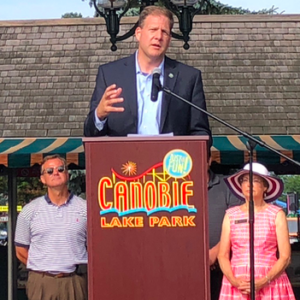Gov. Chris Sununu is creating a task force to look into moving the start date for New Hampshire public schools after Labor Day. And–unlike the bureaucrats running many Granite State school districts–his timing is perfect.
Across New England this week, schools who’ve broken the long-standing tradition and pushed their start dates into August are being forced to send students home early due to the extreme heat. High school soccer and field hockey matches are being postponed.
New Hampshire schools simply aren’t equipped for 90+ degree, high-humidity days. And now, parents have to scramble to find day care for those kids coming home early–yet another unnecessary hassle inflicted by the school calendar. And a reminder why they support Sununu’s idea.
Which they do. The very same day Sununu made his announcement, a new Rasmussen poll shows a majority of Americans agree with him: School should start after Labor Day. And a plurality of respondents in the latest UNH Granite State Poll agree, 40-16 percent.
Gov. Sununu’s executive order establishes “the Save Our Summers Study Commission to conduct a comprehensive review of the impact of beginning the K-12 school year prior to Labor Day, and the feasibility and desirability of passing legislation to prohibit school districts from starting school after Labor Day.” According to the governor, more than half of New Hampshire school districts now start before Labor Day. The executive order also specifically–and repeatedly–mentions the economic aspects of early school starts, which are very real.
Studies show there’s a real economic cost from starting school before Labor Day–the unofficial end of the summer vacation and travel season. A University of Minnesota study found that “the post-Labor Day school start increases the likelihood that families report at least one trip of two or more nights away from home in the month of August or September by 50 percent.”
As recently as 2000, more than half of U.S. teens had summer jobs. Today, that number is down to around one-third. There are multiple factors behind this shift, but one key reason: “More schools ending in late June and restarting before Labor Day,” researchers say. This is not good news in a state already struggling to find enough workers to fill all the available jobs and where tourism is the state’s second-largest industry.
Gov. Sununu talked about the economic impact of early school starts last year when he first suggested a post-Labor-Day school calendar, an impact he saw firsthand as the CEO of the Mount Washington Valley Ski Resort.
“We were seeing a drop off dramatically in business not at the end of August but by the middle of August as families were cutting back on their late summer vacations leading up to Labor Day,” Sununu told the Union-Leader last year.
Most New Hampshire school districts have ignored the governor’s suggestion and joined the early-start movement. And the governor has virtually no power to influence local school calendars, which are hammered out in negotiations between the school districts and their employees. Thus his proposal for a commission, as opposed to legislation.
But for people who are dismissing Gov. Sununu’s school-start-date push as a mere PR stunt, two words: “Market Basket.”
Just last week, Gov. Sununu got a flood of positive press for simply re-tweeting out a complaint about how the popular grocery store chain packages its deli meats. Market Basket responded, and Gov. Sununu got the credit.
Political pundits and campaign insiders love to discuss ideology and governmental processes. But to the average voter, whether or not their family has time for one more weekend at the lake is far more important than most of the political news they see in the paper.
And to the 68,000 people working in the New Hampshire tourism industry, it’s one of the most important issues of all.

